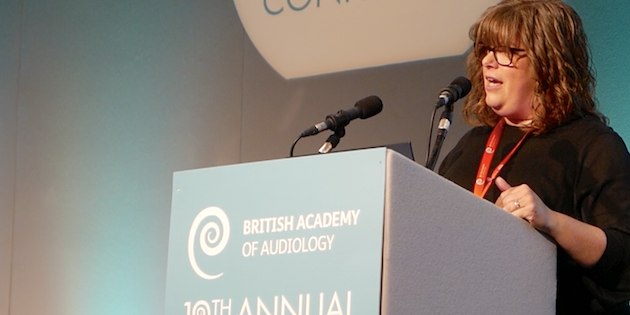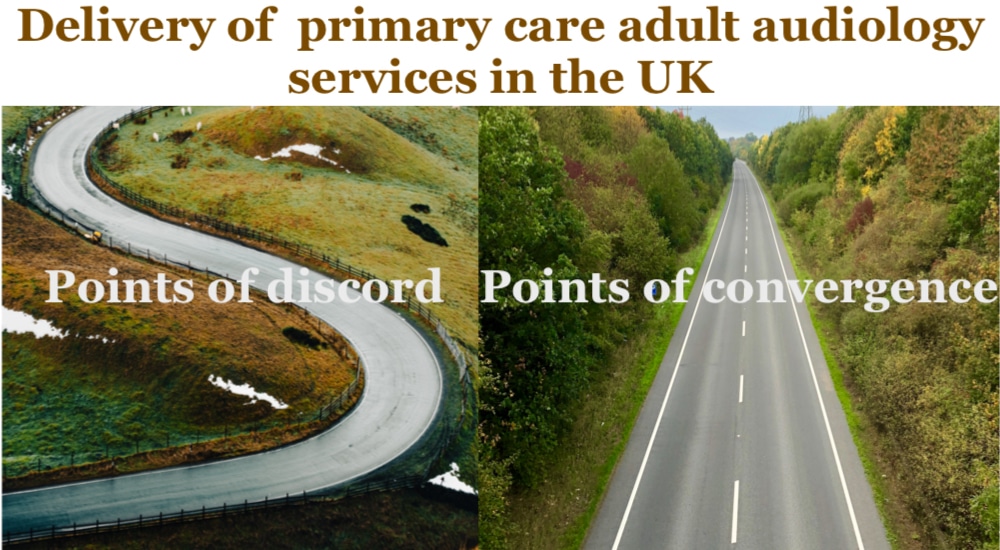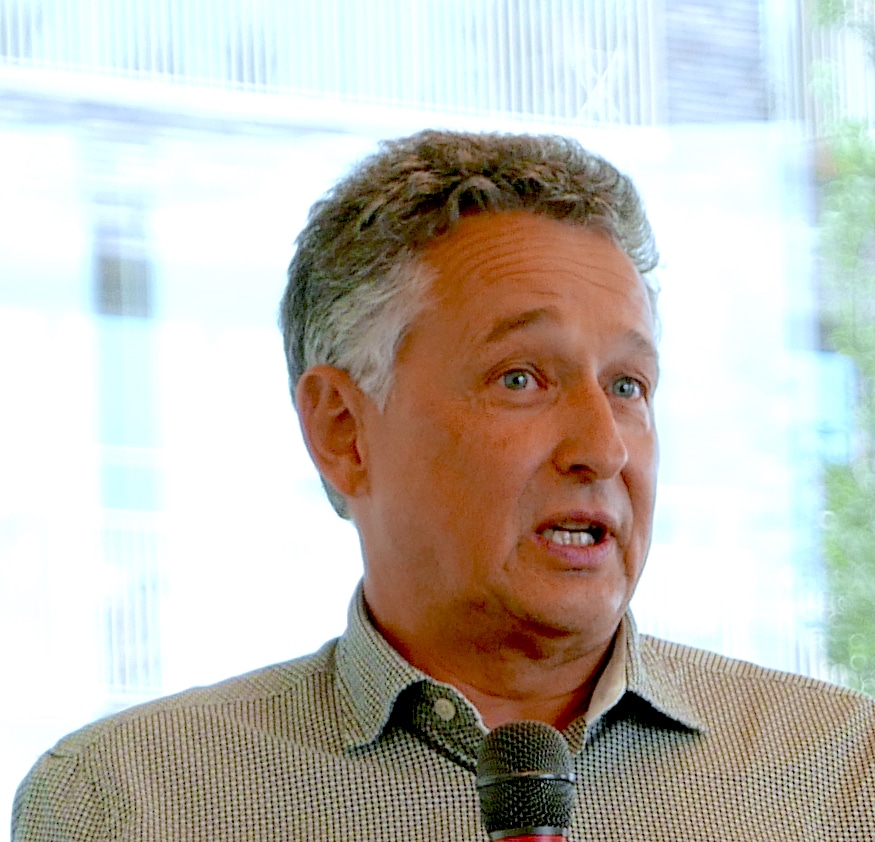Training, recruitment, lack of unity,...the challenges facing audiology prefigure a tough immediate future for A FRACTURED PROFESSION
The 2023 Conference of the British Academy of Audiology was given a soul-stirring launch last November when the group’s newly appointed Vice President, Claire Benton, laid bare the evidence of recent failings in NHS hearing care, carefully exposing her profession’s need for improved funding, appropriate training, and a tightening of discipline. Minutes after her galvanic Bamford Lecture, she spoke to Audiology News UK editor-in-chief Peter Wix about some of the crisis points facing hearing health practice.

The British Academy of Audiology (BAA) presently declares a strategic vision that lists four goals. Strategic goal number 1 is: Being a strong voice for Audiology: Provide the leadership to influence national direction and policy.
Well, there are strong voices at the BAA. Alongside the group’s current President, Samantha Lear, the gentle but adroitly nuanced vocality of its VP Claire Benton, Clinical Scientist and Head of Audiology at Nottingham University Hospitals NHS Trust, should help the association further its other goals of promoting excellence in clinical practice and being the driving force for improving the quality of services, supporting audiologists as professionals in training, and delivering a sustainable organisation.
But there is no doubt that the “challenging” 2024 presaged by Lear in her opening address to the 2023 Conference, and recognised as equally tough by Benton, will leave the outcries of many strong voices echoing back from stony policy offices and around the void left by potential members of the hearing profession choosing other career spheres.
As a profession, audiology “is fractured. There’s a lot of them and us about it, and the whole ‘oh, poor us, the NHS’,” argues Claire Benton.
Fundamental problems currently beset UK audiology, none of which have ready solutions: funding and training loom large.
© BAA Claire Benton, BAA VP (left), and current BAA President Samantha Lear.
Funding and education – desperately required
Assuring standards of quality requires finance, but this, says Benton, is being reduced across NHS integrated care boards (ICBs), and remains uneven. “People’s training budgets have been stripped out,” the VP informed her packed Conference audience, before explaining to this organ how even the learning from conferences is hard to come by for NHS audiology specialists: “I’m quite lucky. I can get people to conference, We’re a big department [Nottingham] and I don’t get looked at very closely at the moment. That will change shortly. There are lots of small departments that have to go through lots of loops to try and get someone to conference, to get someone to sign it off.”
The way in which funding should be used – if it were there – was outlined and exemplified by Benton: “It’s access to training, proper training, competency-led training. So you have a logbook; you don’t just sit in a classroom for a week and think you can then do difficult paediatrics.”
Training assessment, she says, is not about about someone signing off a student because they have seen one child on one assignment. “Once isn’t enough, the theory isn’t enough; it’s a very practical skill.”
Benton proffers the specific skill of Auditory Brainstem Response (ABR) evaluations as an example of where training is failing, denouncing how diluted ABR training is “if it is there at all for audiology trainees. It’s not really in the STP (scientist training programme), not really. There’s no sign off for it, there’s the theory, but it’s quite watered down.”
In fact, ABR is now a module in a new distance learning ABR course at Anglia Ruskin University – blended learning, combining a face-to-face element with online teaching, including an essay and practical exam – running from January to May 2024, and with another in the planning for September, she points out. The module is specifically designed around the British Academy of Audiology HTS newborn assessment curriculum, and it has involved Benton’s BAA colleague Jason Smalley, Clinical Scientist at Queens Medical Centre, Nottingham.
“It’s a bit of in-person, a bit of remote, and then you have a logbook where you get signed off for your practical exam,” explains Benton.
No longer a tough choice between working for the NHS or for chains
The landscape has also become daunting for those getting through their qualifications and then having to pay off loans. As soon as students are ready to enter the profession, they find themselves launched into a business dynamic where they have to compete, and joining a retail chain skilled in self-promotion is currently looking more attractive than opting for an NHS career.
“The high street chains are getting all our audiologists,” says Benton, but she admits that the quality assurance offered by the biggest chain, Specsavers, is “really robust”.
She highlights a vital change in the conditions for graduate audiologists: “People come off their PTP (Practitioner Training Programme). When it was a four year BSc, it was funded, you got salary. It’s really attractive. Now It’s another degree where you come off with debt, so you want to pay that off as fast as you can, and the high street can offer better terms.”
Another lack of incentive is the big gaps between the rungs on the career ladder. “The NHS can take ages to work up the scale,” Benton points out.
“And the NHS doesn’t really promote itself, does it? Individual departments might, but as a whole,…” shrugs this specialist.
Who bears the brunt of failings?
Without doubt, any failings in delivering care hit health professions hard, and audiology is no exception. The 2023 BAA Annual Conference – and probably Conferences to come – was held in the shadow of recent failings by NHS Scotland that addresses by the body’s leaders highlighted with remorse, shame, and a never-again insistence that whatever the excuses might be, professionals had to both accept the responsibility and find the discipline to provide assurances in care from now on.
Benton’s speech referred to a calculation that as many as 3,000 child cases of hearing loss had been missed, but these will have occurred in England, she underlines, in other words in addition to the now notorious cases of NHS Lothian, which were assessed by a BAA report that informed a Review Panel set up by Scotland’s Government, the outcome of which were 36 recommendations to improve the Paediatric Audiology Service to ensure it is both safe and fit for purpose.
Whatever impact the failings have on individual careers and departments, the worst is ultimately borne by the patient.
However well professionals respond to criticism, surely a lack of resources – such as specialist teachers for the deaf, and speech-language therapists – must have a measurable impact on how well professionals can do their work. This is an impact the BAA witnesses, says Benton. “Therapy resources have been scaled down because it’s not the demand. Now we’re finding all those children, they haven’t got that support. So in one of the incident areas, they just have no capacity to support these children who need more intense support because they are late-diagnosed. So they need very specialist speech-language therapy. They haven’t got anyone to do that because over time, you’ve not been funding them, they’ve scaled it all back,” she explains.
Uniting professional associations as one College – new hope!
A “fractured” profession is necessarily a fragmented profession. Each body has a diluted power when it comes to pushing for change, budgetary or otherwise. Many see audiology – which is still not within grabbing distance of becoming a medical specialty – as needing to be represented by one strong body, rather than several distinct groupings.
Negotiations aimed at bringing UK audiology’s professional associations together as one national College of Audiology reached an impasse in November 2019 when the BAA began its own conference that year in Liverpool by announcing its board’s decision that it “will not continue the discussions of a college of audiology in the current format”. Benton, who revealed that talks are now taking place with the British Society of Audiology (BSA), the British Society of Hearing Aid Audiologists (BSHAA), and the Association of Independent Hearing Health Professionals (AIHHP) to define terms of reference for a full resumption of the College push, clarified that “we didn’t oppose College; we opposed how they were going about creating it”.
The BAA VP underlined that the sticking point that needed to be unstuck revolves around a democratic principle: the College decision should be made by groups that represent their members. “We are membership bodies. We should be involving our membership in these decisions. Membership should vote,” affirms Benton.
“Our approach to it [College] and how we wanted our membership involved in the decisions and the planning of it was being stifled and controlled a bit, so it was not the College that we disagreed with; it was how the talks were going at that point.”
Benton is in no doubt, however, about the desirability of the UK audiology profession uniting under one College, first and foremost to achieve a quality assurance mandate.
“It needs a College; that would bring the standard and the recognition up,” Benton underlined.
Source: Audiology News UK Issue 06 Jan-Feb 2024



